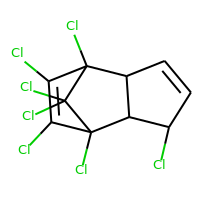
Heptachlor
| Pubchem identifier | 3589 |
| CAS identifier | 76-44-8 |
| IUPAC name | Heptachlor |
| Structure |  2D:2D MOL2D MOL22D SDF 3D:3D MOL3D MOL23D SDF3D PDB3D PDBQT |
| SMILES | C1=CC(C2C1C3(C(=C(C2(C3(Cl)Cl)Cl)Cl)Cl)Cl)Cl |
| InChI | InChI=1S/C10H5Cl7/c11-4-2-1-3-5(4)9(15)7(13)6(12)8(3,14)10(9,16)17/h1-5H |
| InChIKey | FRCCEHPWNOQAEU-UHFFFAOYSA-N |
| Synonyms | E 3314; H-34; H-60; Aahepta; Arbinex 30TN; Basaklor; 3-Chlorochlordene; Dicyclopentadiene, 3,4,5,6,7,8,8a-heptachloro-; Gold Crest H-60, Termide; GPKh; Hepta; Heptachlor; Heptachlor (technical grade); Heptachlorane; 3,4,5,6,7,8,8a-Heptachlorodicyclopentadiene; 1,4,5,6,7,8,8-Heptachloro-3a,4,7,7a-tetrahydro-4,7-endomethanoindene; 1,4,5,6,7,10,10-Heptachloro-4,7,8,9-tetrahydro-4,7-endomethyleneindene; 1,4,5,6,7,8,8a-Heptachloro-3a,4,7,7a-tetrahydro-4,7-methanoindane; 1(3a),4,5,6,7,8,8-Heptachloro-3a(1),4,7,7a-tetrahydro-4,7-methanoindene; 1,4,5,6,7,8,8-Heptachloro-3a,4,7,7a-tetrahydro-4,7-methanoindene; 1,4,5,6,7,8,8-Heptachlorotetrahydro-4,7-methanoindene; Heptachlorotetrahydro-4,7-methanoindene; 1,4,5,6,7,8,8-Heptachloro-3a,4,7,7a-tetrahydro-4,7-methanol-1H-indene; 1,4,5,6,7,10,10-Heptachloro-4,7,8,9-tetrahydro-4,7-methyleneindene; Heptagran; Heptagranox; Heptamak; Heptamul; Heptasol; Heptox; 4,7-Methano-1H-indene, 1,4,5,6,7,8,8-heptachloro-3a,4,7,7a-tetrahydro-; 4,7-Methanoindene, 1,4,5,6,7,8,8-heptachloro-3a,4,7,7a-tetrahydro-; OMS 193; Rhodiachlor; Soleptax; Technical heptachlor; Velsicol 104; Velsicol heptachlor; 1,4,5,6,7,8,8-Eptacloro-3a,4,7,7a-tetraidro-4,7-endo-metano-indene; 1,4,5,6,7,8,8-Heptachloor-3a,4,7,7a-tetrahydro-4,7-endo-methano-indeen; 1,4,5,6,7,8,8-Heptachlor-3a,4,7,7,7a-tetrahydro-4,7-endo-methano-inden; Eptacloro; Heptachloor; Heptachlore; Latka 104 |
| External identifiers | D006533 CHEMBL194400 |